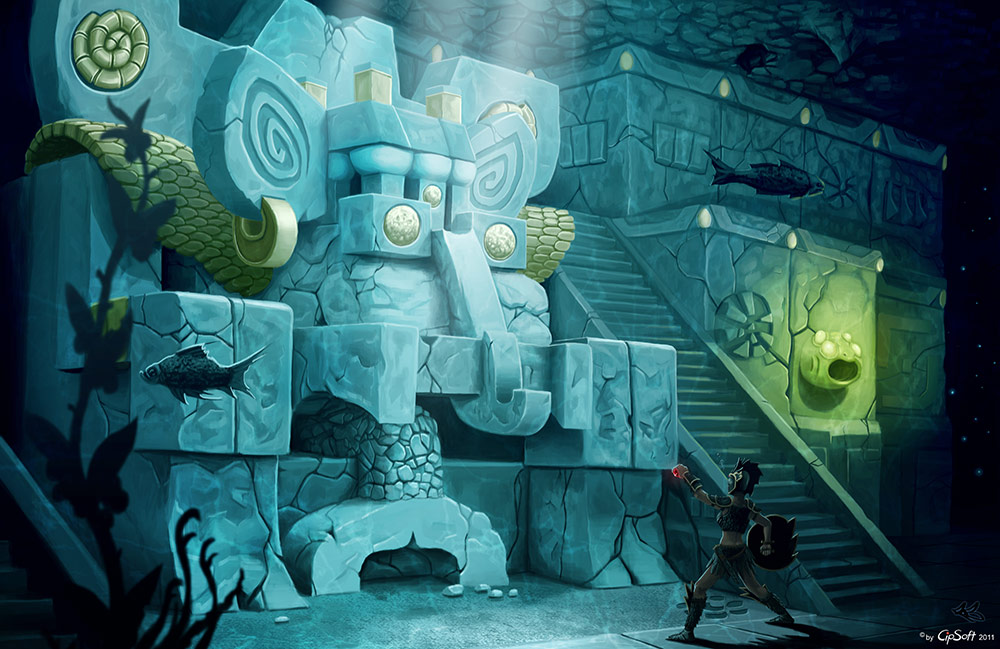Jekhr outside of Fiehonja
We’re going to explore Jekhr.
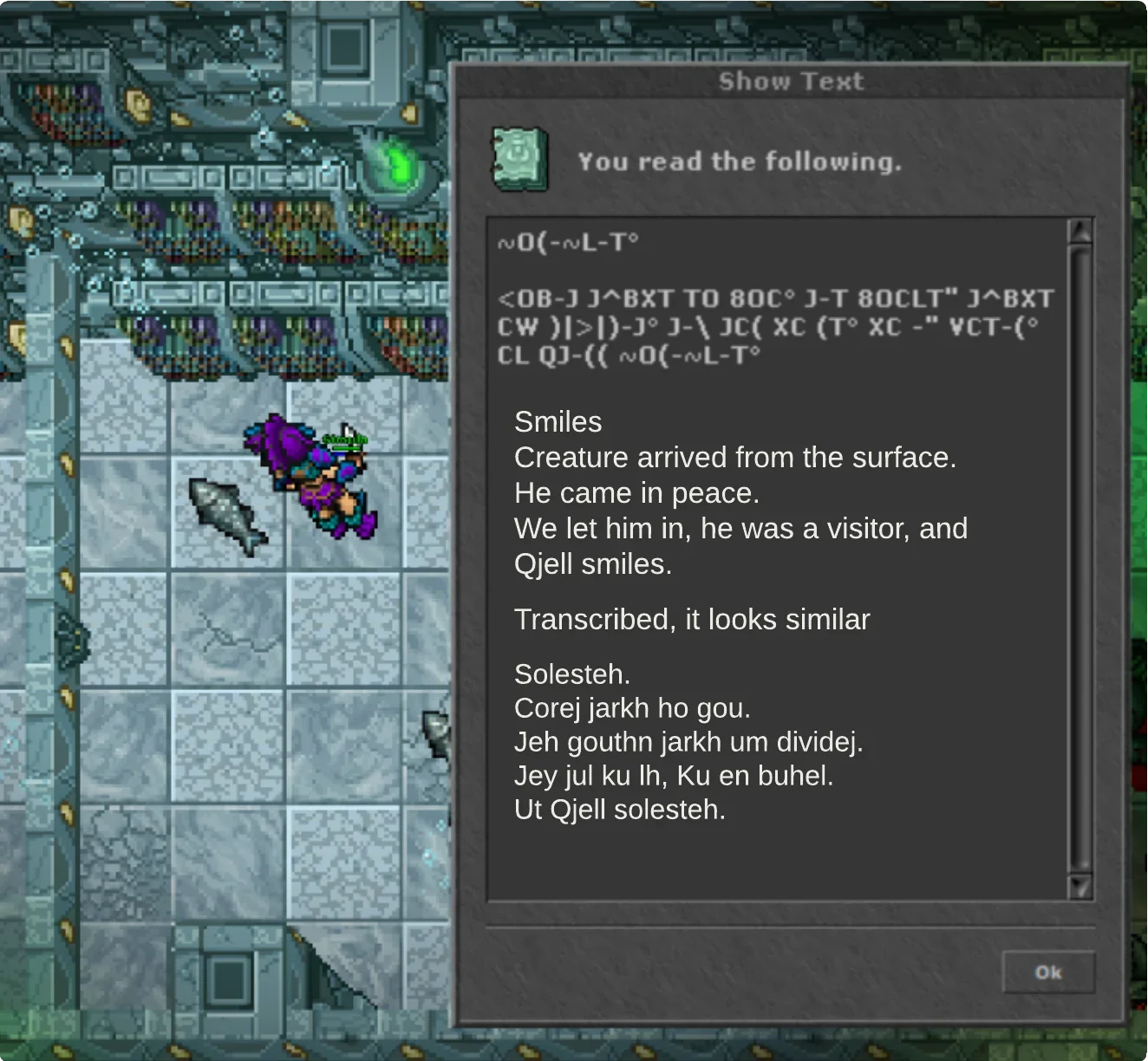
But outside of Fiehonja, the city of Light.
In my post on goblins I showed how the goblins language might be the same as ancient language, lizard language, cavemen language, elven language and Jekhr - the deepling language.
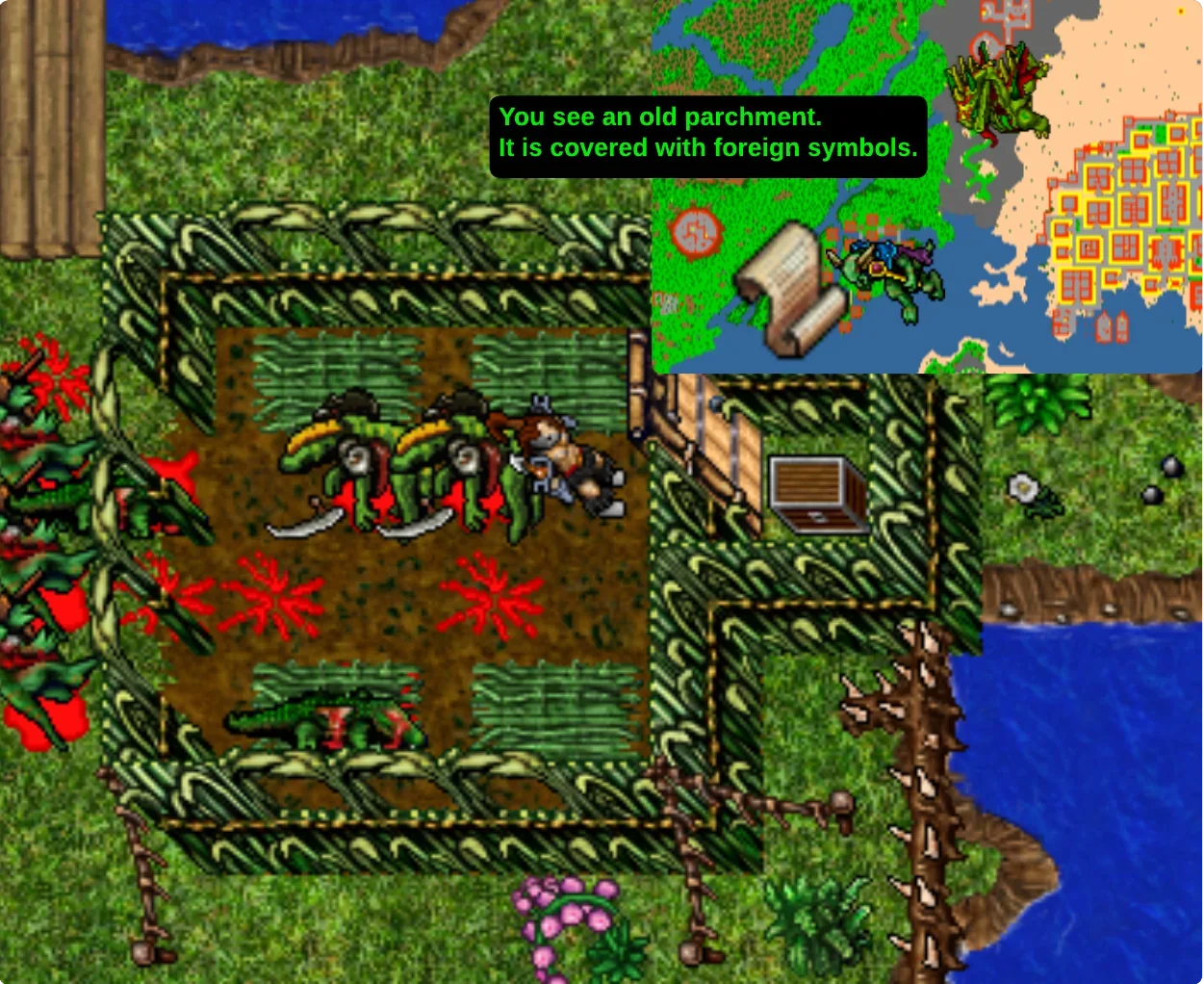
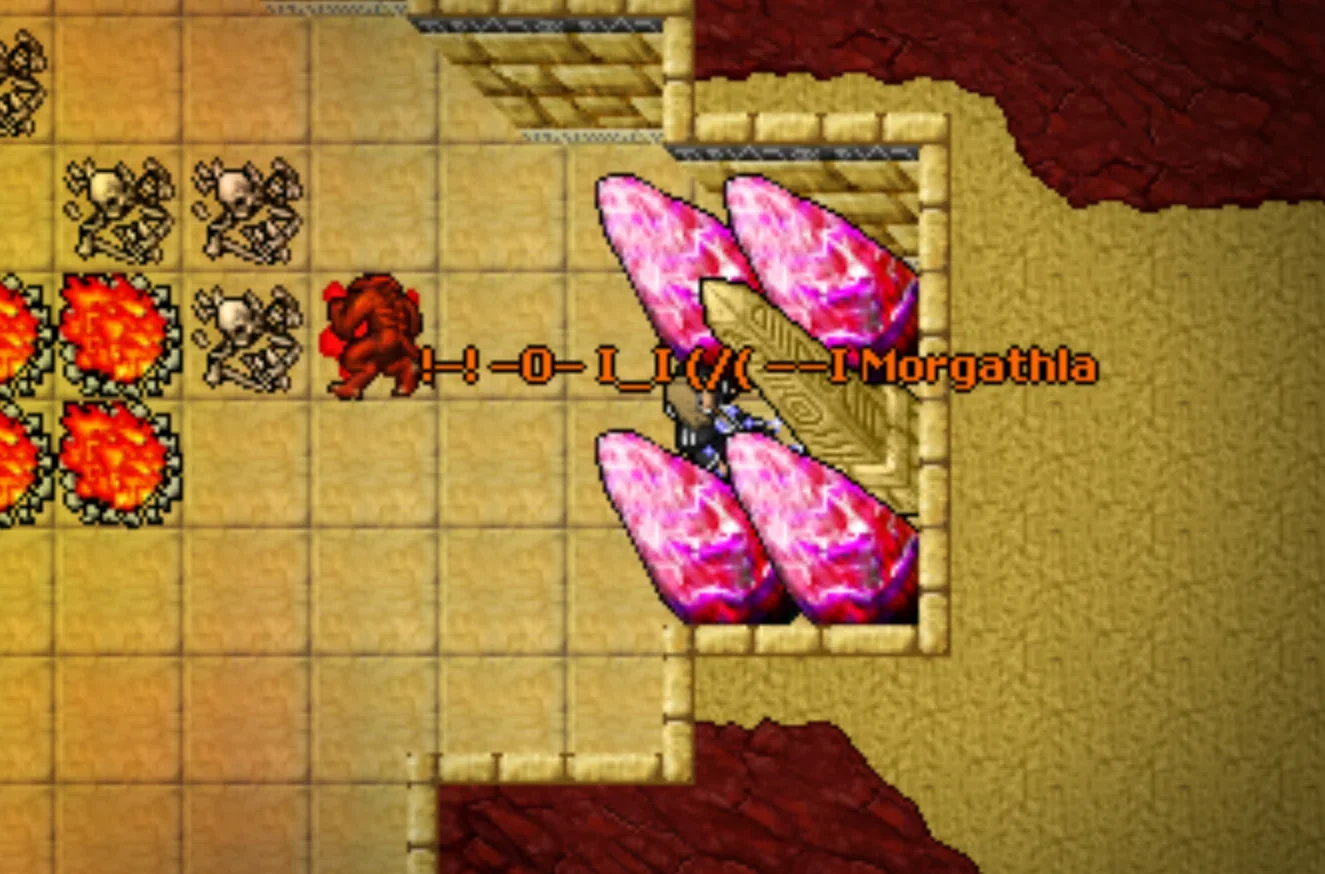
For Jekhr we get a lot of translations written by Lagatos, he also teaches us some of the basics:
{book-Jekhr Pronouns} The Deepling Language, Volume II: Exercises
By Lagatos, Chronicler and Scholar
The Deepling language is not yet understood to its fullest. However, it mostly consists of nouns and basic, infinite verbs.
Exercises, Chapter I: Pronouns
I/me = jh
we/us = jey
you = na
the/that/this = jeh
As well as how a single word can be built upon to create complex nuances.
{book-Jekhr Basic Vocabulary I} Exercises, Chapter II: Basic Vocabulary 1 (A-D)
Additional notes: Most complex words are constructed of smaller basic vocabulary. For example: ‘surface’ (‘gouthn’) consists of ‘over/up’ (‘gou’) and ‘face’ (‘thn’). Ligatures appear as consonants only as in ‘Qjell’ (‘Qjell’). An ‘i’ at the end of a word will always be pronounced as ‘ee’. A verb is negated if it is followed by ‘ro’. For example: ‘lume’ (‘reach’) followed by ‘ro’ (‘not’) means ‘not to reach’.
alive/life=kejh
and=ut
armed=tanakk
ascend=forfai
be/is/was=en
…
(click on book icon for more)
We are also told that the language has evolved over the years.
{book-The Second Coming of Qjell} … Note: The texts I discovered that deal with the time after the First Coming seem to be in a younger tongue and written entirely different from the older works. The newer passages are more like chants to be recited and memorised. …
While translating the so-called book ‘5’ and ‘6’, which I couldn’t find any translation of online, I noticed that even some letters have to be substituted before the word gets any meaning.
This seems to only be true for the older texts.
{more-Translation of book 5}
{book-Deepling Book 5 Translated} Original:
~-"+, )^|J-| "J^° LO" -( <OB-J LO J-L "J^ )O"~^+L J-L B^C J^B+L J-L LO" J|"J^ -" J-L =(^L LO ~"-+, )^|J-| "J^° -( J-L JC>" LO B^C J^B+L )JOC, +C (O")-| JL(| CUL- 8(|-° BOC" +C (C8J- J-L UOL, +O(+ LO BOQOL" -" (OC)JOL <- J-L J^(O| JL(|° +C >O(UOL J-L +U-|J CL ~OJ^( J-L B^C J^B+L° J-\ (\ LO "^ CU ^BJ^+ ~"-+, )^|J-| "J^°
Alphanumeric:
SENX DAIJEI NJA. TON EL COREJ TO JET NJA DONSAXT JET RAU JARXT JET TON JINJA EN JET FLAT TO SENX DAIJEI NJA. EL JET JUVN TO RAU JARXT DJOU XU LONDEI JTLI UWTE GLIE. ROUN XU LUGJE JET WOT XOLX TO ROQOTN EN LOUDJOT CE JET JALOI JTLI. XU VOLWOT JET XWEIJ UT SOJAL JET RAU JARXT. JEY LY TO NA UW ARJAX SENX DAIJEI NJA.
Pronounced:
senks daijei nja. ton el corej to jet nja donsakst jet rau jarkst jet ton jinja en jet flat to senks daijei nja. el jet juvn to rau jarkst djou ksu londei jtli uwte glie. roun ksu lugje jet wot ksolks to rokotn en loudjot ce jet jaloi jtli. ksu volwot jet ksweij ut sojal jet rau jarkst. jey ly to na uw arjaks senks daijei nja.
Substitution:
SENX invader deep/depth/profound. TON when/if creature shall JET deep/depth/profound DONSAXT JET two/second JARXT JET TON gift were JET FLAT shall SENX invader deep/depth/profound. when/if JET JUVN shall two/second JARXT strike/force XU turn/turned JTLI UWTE fame. where/wherever XU touch/touched JET WOT XOLX shall ROQOTN were LOUDJOT by/with JET boil/boiling JTLI. XU VOLWOT JET XWEIJ and herald/heralded JET two/second JARXT. we/us bow shall you UW ARJAX SENX invader deep/depth/profound.
Evolved Words:
TO = HO = from/of the
DONSAXT = donsakh = embrace
JARXT = jarkh = coming/arrival/come
FLAT = flah = dawn
JUVN = jubn = tide
UWTE = umte = into
XOLX = kolk = carcass
LOUDJOT = loudjou = swallow
JTLI = jhli = sea/water
XWEIJ = kweij = way
WOT = moh = ground
VOLWOT = bolmoh = pave/paved
ARJAX = arjak = battle
Evolved Substitution:
SENX invader deep/depth/profound. I
when/if creature shall the deep/depth/profound embrace the two/second coming the first gift were the dawn shall SENX invader deep/depth/profound. when/if the tide shall two/second come strike/force him turn/turned water into fame. where/wherever he touch/touched the ground carcass shall non-believer were swallow by/with the boil/boiling sea/water. he paved the way and herald/heralded the two/second coming. we/us bow shall you in battle SENX invader deep/depth/profound. Interpretation:
Senx, book one.
When the creatures of the deep shall embrace the second coming, the first gift will be the dawn of Senx the invader of the deep. When the tide of the second coming strikes he’ll turn water into f(l?)ame. where he touch the dead bodies of those that don’t obey will be swallowed by the boiling sea. He paves the way and heralds the second coming. We shall bow to you in battle, our profound invader Senx.
{/more-Translation of book 5}
In essence, the word DONSAXT transcribed from Jekhr has no entries in the given dictionaries, but if we replace X with K and T with H we get DONSAKH, which means ‘embrace’.
In other texts and in similar fashion we find: XOLX = KOLK = carcass, X becoming K, moreover there’s W becoming M, B becoming V. etc. There’s a system to it, and there are a lot of words we have to do this with. The odds for this being a coincidence while translating into coherent books would be astronomically low.
What I’m trying to say is, that if we find words elsewhere, we got to take into account that
- It likely has evolved over time and is not a 1:1 translation
- Since Jekhr is underwater, there might be a ‘bubble’ effect possibly causing characters to be heard differently.
- Since these dictionaries were the interpretation of Lagatos, the meaning might not be 100% true.
- A single word of deepling language has many meanings depending on context.
- We might only find parts of words.
Let’s begin with some findings.
{more-Exhibit One: Tatak}
armed=tanakk
“Tanjis arm/tanakk the deep and Qjell watches.”
Here we find a very similar word used by the cavemen who lives side-by-side with the deeplings.
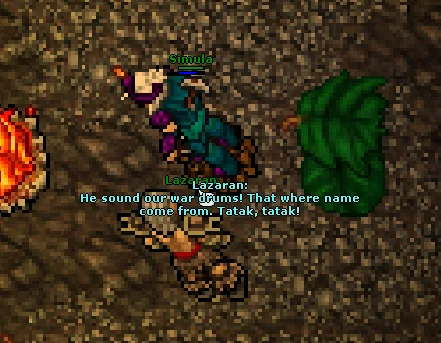
I interpret tatak as: when sounding the war drums you are effectively telling everyone to arm up, preparing for battle, signaling everyone.
At the very least, tanakk and tatak is:
- Similar look
- Similar pronunciation
- Very close by geographically (Zao and Fiehonja)
- Similar meaning, about battle / arming up
{/more-Exhibit One: Tatak}
{more-Exhibit Two: Jaccus Maxxen}
naxx = nakk = weapon
“He is our weapon/naxx in the dark” (book)
See those weapons? His lore fits with it too.
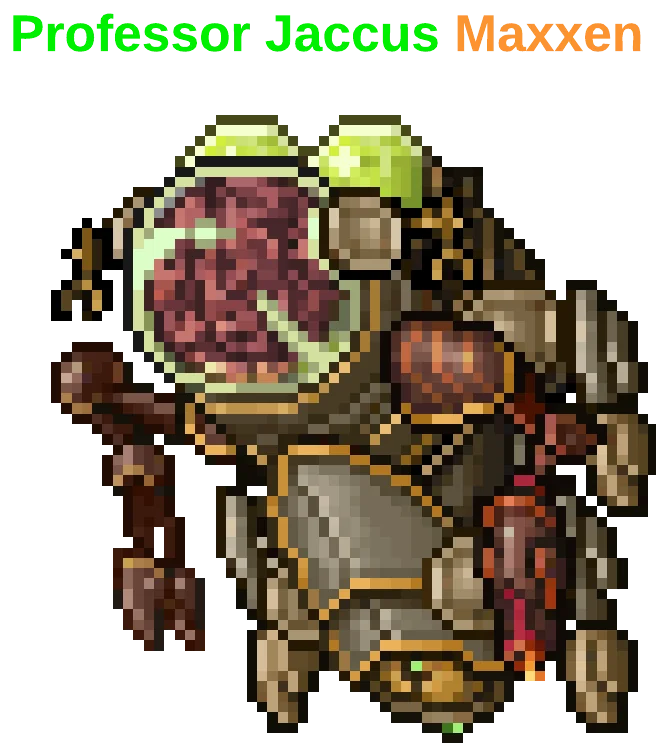
Maxx and Naxx is very similar.
Also guns. And weapons.
{/more-Exhibit Two: Jaccus Maxxen}
{more-Exhibit Three: Oskayaat}
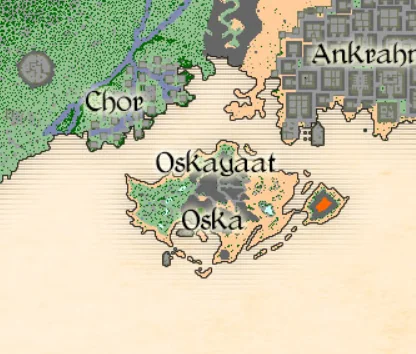
down=osk
fallen=oskijah
The land down under? Land of the fallen?
Oskijah is pronounced Oskijaa(t?).
Oskijaat very similar to Oskayaat.
Maybe?
{/more-Exhibit Three: Oskayaat}
{more-Exhibit Four: The City of Gold}
Galthen and the City of Gold
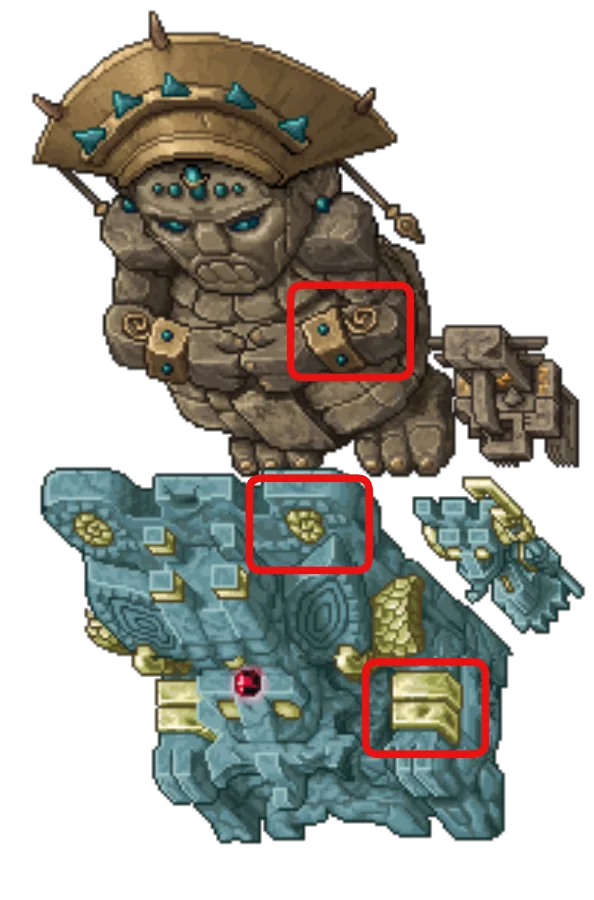
They don’t have many ornaments, but the one they do have is similar.
- Squared design with snouts
- Spiral
- Some kind of squared band around their arms
- A crystal on the forehead.
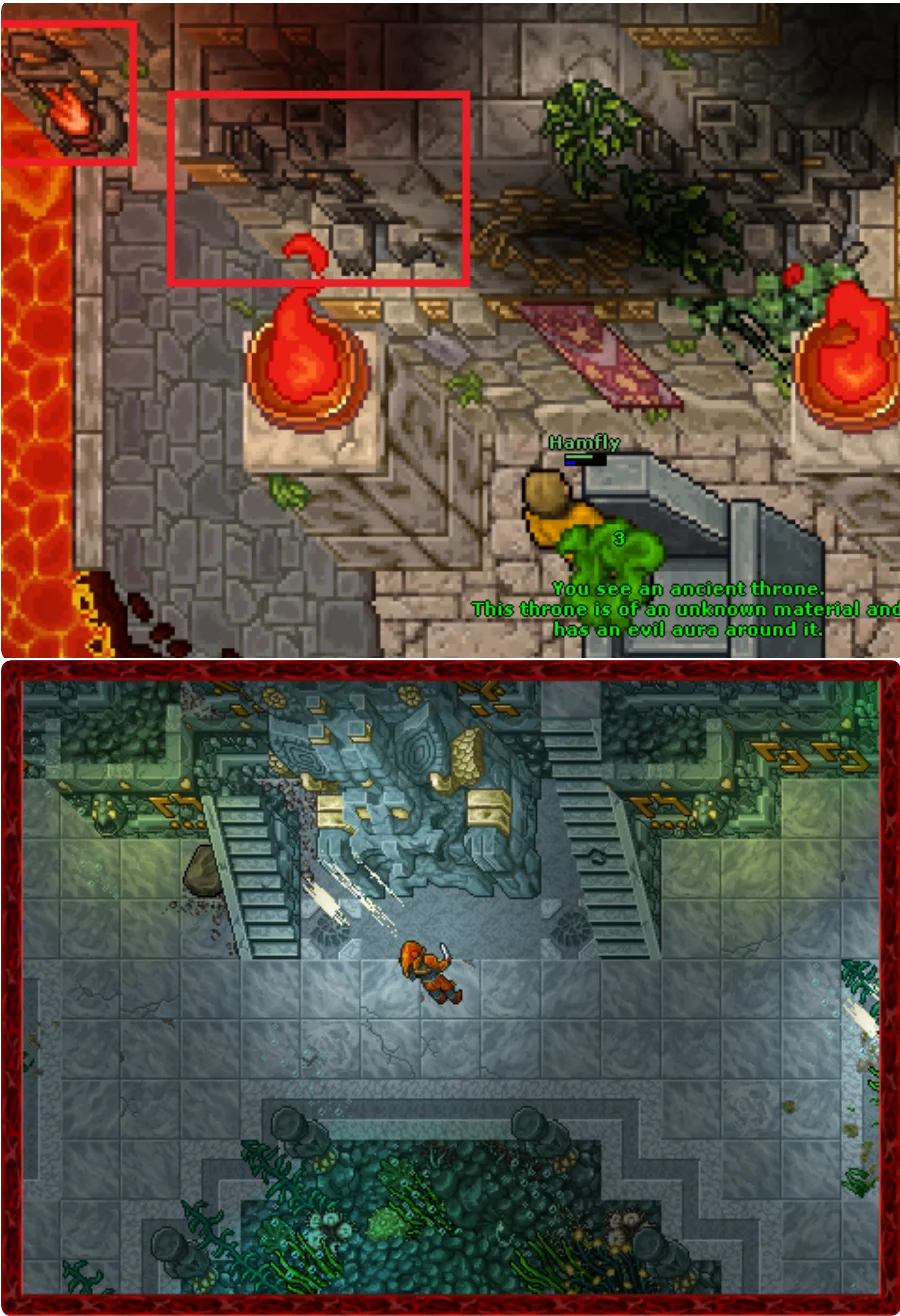
Not only that
- The ancient throne in Ahau’s room looks to be made of coral, the material in Fiehonja.
- Both are cities of gold and light.
- (Out of Tibia) Lionet made the content for both areas, including Jekhr.
The Iks were building a lot of underground cities, hiding from something called Kopakhn
{book-The Iks} … Due to a lingering fear of the wrath of Kopakhn, god of the balance of life, the people of the Tribe of Iks have been building vast underground cities and palaces. Kopakhn was thought to be the bringer of a cleansing storm, sweeping over the face of the known world. Destroying man, animal and growth alike. …
Which sounds like the curse / Variphor behaviour.
Reminds me of The Lightbearers. Seemingly putting gold and light everywhere when trying to undo, stop Variphor.
destruction/destroy=jakhn
god-king=reykhn
Here, kopakhn and jakhn/reykhn has a very similar meaning
- God / King
- Destruction / “cleansing storm, sweeping over the face of the known world. Destroying man, animal and growth alike.”
They would be pronounced Jakaan and Kopakaan.
{book-Jekhr Basics} Note that when spoken aloud, a ‘T’ (as in ‘h’ or ‘H’) will be pronounced ‘aa’. It is only pronounced ‘h’ if at the beginning of a word. The word ‘jakhn’ (to destroy/destruction) will be pronounced: “jakaan”
{/more-Exhibit Four: The City of Gold}
Bonus
Now that we’ve seen examples in several places, we can find some other interesting similarities, consistencies and patterns.
Curiosa!
{more-Exhibit Five: Roshamuul}
Roshamuul and the moon goddess Amati.
{book-The Fall of the Moon Goddess} … Since the beginning of our existence, we have worshiped the moon goddess Amati. She always stood high in the sky, looking down on us benevolently and lighting up the nights. …
We find the translation of Roshamuul from the sleepwalking inquisitor Morax in northern Roshamuul.
Player: roshamuul / city
Morax: The Heart of Midnight…so beautiful... dream.
We can find that the word ‘roshamuul’ consists of several concatenated words, as seen exclaimed by the Terrorsleeps:
Aktat Roshok! Marruk!
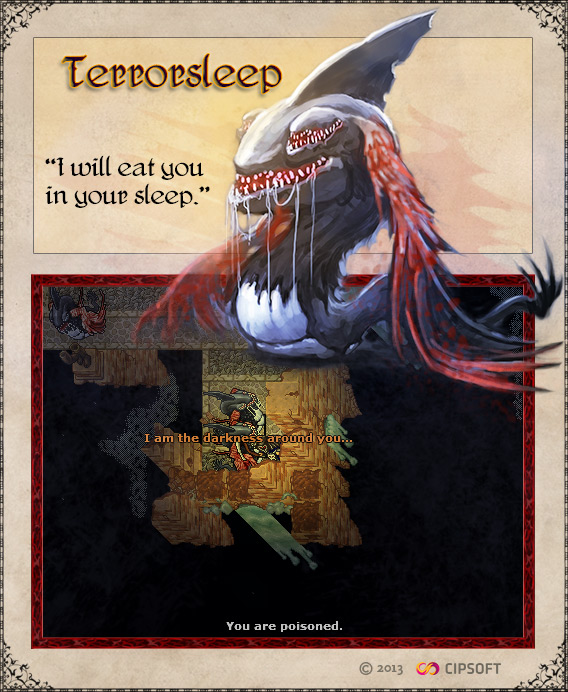
-
Roshseems then to be a single world. We could think that Rosh=heart. -
amIs found in bothAmati and the word roshamuul which is likely night. Moon goddess and night. -
amon a 12-hour clock, the first 12-hour period from midnight to noon, is AM. -
uulcould be nuances of ‘theheartofmidnight’ulis a common suffix for words in ‘ancient language’.
{/more-Exhibit Five: Roshamuul}
{more-Exhibit Six ???}
None at the moment. 😭
If I find anything, I’ll add it here.
If you find anything, please let me know and we’ll add it here together.
Credits: you.
{/more-Exhibit Six ???}
{more-Bonus}
The language looks very similar to for example the Mehrah Asram book found in Ankrahmun.
- They put ‘h’ everywhere, which is pronounced as ‘aa’
- ‘a’ everywhere
Player: Lizard
Lazaran: No, no, me called Lazaran. Not Leezaraad.
The are only few words we can translate using substitution system for old Jekhr, such as the title Mehrah = bed-soul (sleeping dream / dream magic) which fits the theme of the dream experimenters at Serpentine Tower.
The underwater variant understandably has lots of ‘J’s
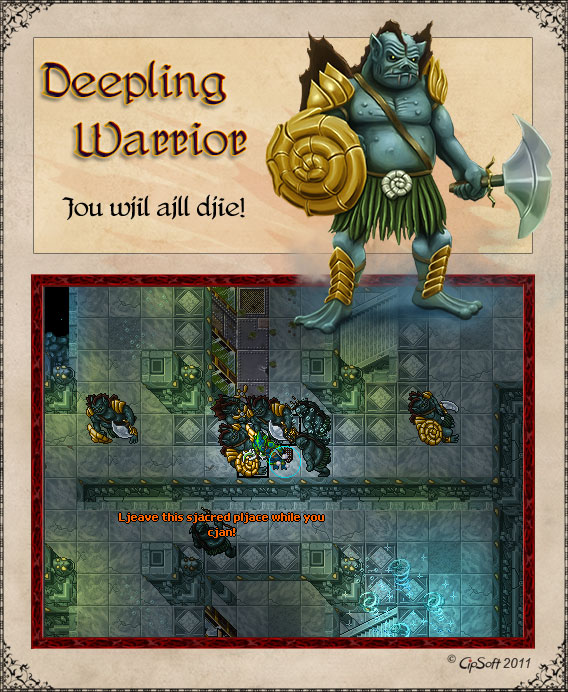
Ljeave this sjacred pljace while you cjan!
Jou wjil ajll djie!
I guess it happens when you’re talking underwater.
TANJIS TANAKK HO NJA UT QJELL AFAR.
OBUJOS OBU HO NJA UT QJELL LHNJEI.
JAUL JAU HO NJA UT QJELL SOLESTEH.
It’s fun to think about all these various names, such as Fah’Radin, Qual’Jehari, Zathroth, Morgaroth, Ghazbaran, Arkhothep - could be pronounce Zataarotaa, Morgarotaa, Gaazbaran, Arkaaotaaep?
{/more-Bonus}
Conclusion
{more-Conclusion}
Well, I’m very interested if we can find more, and
- I think Jekhr and all other ancient languages come from the same root and evolved over time.
- Fiehonja and the Iks seem very connected.
Most of these came naturally after staring at the deepling language for so long and finding similarities at other times.
I’m very interested to hear if you’ve found anything similar!
On other news, Port Hope has been fully documented and can be read on NPSearch, from this project.
I found Ahau’s Dead Chamberlain especially interesting, where did that ‘device’ keyword come from?
And a sweet interaction with Perod, who sells distance equipment in the market of PH.
Player: name
Perod: I am Perod, how could you forget that, Player? We fought back-to-back in those troll caves on Rookgard a long time ago. — {/more-Conclusion}

